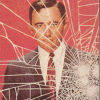Re: those sadism accusations I always thought Amis was pretty spot-on with his theory, most accusers simply misunderstand Bond, or sadism. Most probably they misunderstand both. Whether on purpose I wouldn't know...
It has - sadly, I hasten to add - become alarmingly popular in our present-day entertainment to depict acts of gross violence and the most despicable sadism and invite the audience to appreciate, approve and quite often get their kicks from such entertainment. Only, Bond's literary adventures practically never stoop to such complicity with the mob and its instincts. Yes, violence is used with gusto and effect, that is without a doubt the mark of the thriller. But the element of inviting the reader to feast - secretly or openly - on the violence is nearly entirely absent from the books. The violence's purpose is to horrify, not to arouse. Bond doesn't get his kicks from shooting Scaramanga or strangling Blofeld. I dare say neither did most of Fleming's readers. Those who look for such excitement will have found a different source of thrills in their day. I'm never sure if modern interpreters claiming to have found huge portions of sadistic catharsis in Fleming describe their actual findings or their lack of distance to the topic. There have of course always been individuals who read Fleming to support their private fantasies of a somewhat 'special' nature. But I'd still argue you can't really blame Fleming for the particular nature of his readers. The US Constitution and the Communist Manifest will have a similar number of sadists amongst their readers no doubt.
"Innocence", wrote Ian Fleming in those notebooks of which Henry Chancellor makes splendid use in James Bond: The Man and his World (John Murray, £20) and that are germane to the imagined world he made in his novels, "is appealing but it isn’t interesting. It belongs to flowers and vegetables and tadpoles only. The guilty are interesting because they have lived in the world we know, which is a guilty place full of guilty people. The only interest of innocent people is that they are about to become guilty as they must with age."
I do not think that he believed this for a moment; I think that it is innocence for which he hankers. It perhaps takes a Scot to balance against innocence not corruption but guilt; this split goes through the man and his work and his unhappy life that has left us with such a stash, though, of reliably pleasurable reading.
No, I think Fleming was spot-on with this. That was in fact his trick (and Chandler's before him, and Hammet's before Chandler, and Donald Hamilton's and John D. MacDonald's at roughly the same time): putting the knight in shining armour inside a contemporary suit or tee-shirt and let the saintly superhero have vices and doubts and very carnal cravings. And slay the odd dragon from time to time. There can be no doubt that Bond is a superhero. Only, he's not aware of it. He pretends he's an ordinary human being. And that's what makes him interesting because we - ordinary humans - can in turn pretend to be Bond-like.
Ian Fleming was born to quite new money, made by his prodigious working-class grandfather from Dundee. His father Valentine was killed in 1917, leaving four sons, of whom Ian was the second. A knotty will tied the forceful mother for life to her boys. She admired success and would tolerate nothing less. The oldest boy Peter was golden, captain of the Oppidans at Eton, very clever, and, it was to transpire, a natural and brilliant writer. Ian was not academically clever. Peter had scooped all the school’s great prizes. Ian became a most successful athlete, the victor ludorum, at a school where athletics has for some reason never been thought as prestigious as rackets or cricket. This seems to be so to this day.
The better Peter was, the badder Ian became. His deep habits of sadism and sternness with himself were laid down, painful (if sometimes ostensibly pleasantly so) for their possessor, but thrilling once transformed from neurosis into stories, for us, his readers.
Henry Chancellor has produced an amazingly rich volume that uses the life of Fleming to shed light upon his creature Bond with an intelligence unusual in even a serious biographer. The illustrations are a wonderful bonus. The whole may be referred to or, as I recommend, read from cover to cover at once, twice. It is a reflection upon a time and a class as well as upon the nature of secret worlds that have much in common, the worlds of the writer and the spy.
This is one of the most common traps, the idea Fleming was upper-crust and elitist because of the class he came from. No, the class he came from was nouveau riche and few people were more despised than those. Perhaps the most vehemently by their own class, thus providing the fitting curse of the bourgeoisie, a constant ambition for more wealth and a pursuit of the missing - at least in their own perception - approval of their peers. The only ones worse off used to be nouveau riche having lost their riches or in some other way 'in a tight spot'. That made them just nouveau, not a state to aspire to.
And Fleming's situation was exactly that, always pushed to excel, by his mother, by his spectacularly successful brother, by his heroic father figure, by his own aspirations. The place Fleming thought was rightfully his - by his class, by his intelligence and abilities - was always taken long before he could even start to stand on his own feet. Pubertal rebellion against his father was impossible, against his mother not within his capabilities, neither emotionally nor materially. Fleming was dependent on his mother's goodwill, deferred to her time and again and was deeply miserable for it. Rightfully so. More than once he had failed showing basic character, backing down in exchange for a cheque. The self-loathing some of Fleming's contemporaries talk about was no doubt a result of this suffering.
Edited by Dustin, 17 September 2013 - 08:39 PM.






